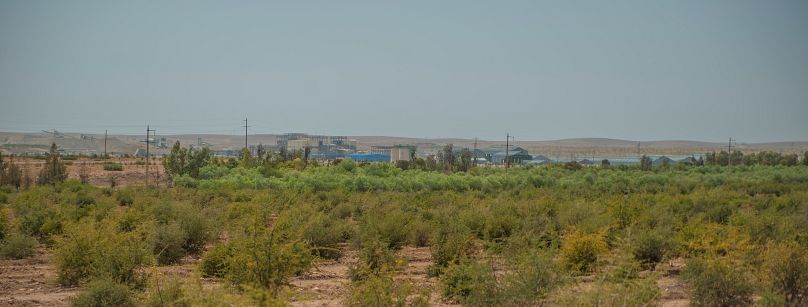Soil health is fundamental to the future of the planet. Without fertile land there would not be enough food to go around, and the resources we have need to be carefully guarded.
OCP Group manages Morocco’s phosphate reserves, which are essential to the production of fertiliser worldwide. As a responsible company, the group’s ambitions are to ensure the maximum efficiency of their operations and to reduce the environmental impact now and in the future.
The fertiliser producer is in the gradual process of rehabilitating former mines and marginal lands with several kinds of sustainability projects, such as planting hundreds of trees across their sites.
Since 2013, OCP has adopted a new approach to rehabilitating its mines by restoring the original ecosystems and natural landscapes and enriching them.
Life after the mines: soil rehabilitation and the set-up of a model farm
The rehabilitation of soil begins as soon as land is earmarked for mining. Before any excavation takes place, the fertile topsoil is removed and then stored for later use in developing new land, often land adjacent to working mines.
Research is then conducted to determine the most resilient crops for the area. These need to be drought-resistant and adapted to the soil conditions. The land itself will have top soil, compost and appropriate microorganisms added, as well as earthworms. Irrigation systems are set up to maximise the use of harvested rainwater.
Trees and crops, particularly cereals and aromatic plants, add value to previously barren land, and also bring socio-economic benefits for local farmers.
At the Gantour site, 1200 hectares of former mining land were earmarked for rehabilitation and reforestation, and since 2015 around 42,000 trees and crops of different species have been planted on the land. The majority of these were chosen for the specific climatic conditions of the region, such as quinoa, rosemary and goji berries, but experimental varietals were added for the purposes of research.
The goals for Gantour and a similar initiative in Khouribga include the rehabilitation of 1,000 hectares a year, equivalent to twice the amount of land exploited for phosphates. By the end of 2020, the OCP group was already behind the planting of 4.5 million trees across 4,500 hectares of its former mining sites, with hundreds of thousands of olive and argan trees now thriving on land that had been abandoned.
Ultimately, OCP hopes to recover more than 17,000 hectares of land in the sites of Khouribga, BenGuerir and Youssoufia alone, planting cereal crops, fruit trees and forests, along with vegetables and plants for biofuels.
As well as the land once used for mining and phosphate processing, OCP is working to transform large tracts of marginal land – land thought to have such low-quality soil as to make it unusable for agriculture. This can include land that had previously been intensively farmed to meet the demand of nearby urban populations; land in arid and semi-arid regions where intense evaporation leads to a high degree of salinity, and land that has been polluted.
A parallel mission is to address the challenge of salinity, and OCP created the African Sustainable Agriculture Research Institute (ASARI) to ensure livelihoods and food security in the southern regions of Morocco where this is an issue. The project uses biotechnology research to find solutions for agriculture and animal production.
Reduction of CO2 emissions: carbon farming projects
The resulting rehabilitation is also expected to significantly improve the company’s carbon footprint. Afforestation in these arid sites and former mining areas is an important tool to sequestrate CO2 emissions, while ensuring incomes to the communities local to OCP's sites
In 2018, OCP launched a ‘carbon farming’ project in a joint collaboration with the Mohammed VI Polytechnic University (UM6P) and the Scandinavian energy company St1. By creating carbon sinks on former mining land and other arid zones, it aims to mitigate the effects of climate change.
Still in its pilot phase, the project has involved the identification of fast-growing plant species and the optimisation of their growth in arid and semi-arid areas by using different irrigation techniques and soil treatments.
An ‘ecosystem’ approach supporting local cooperatives
OCP’s commitments to sustainable development goals are not confined to environmental protections. Local communities are the first to benefit from these projects, which aim to have a positive effect on society, strengthening skills and creating jobs.
The aim of OCP’s ‘ecosystem’ approach is to support and oversee the creation of agricultural projects that provide socio-economic development opportunities for the region and its communities.
The objective of these projects is to make mining land available to partner farmers (agricultural cooperatives) and to support them along the entire value chain in order to obtain complete, certified products of a high quality, which can be easily inserted into the market, using the best agro-ecological practices.


